最新人教版新目标八年级下册英语Unit-1-知识点
新版新目标英语八年级下册unit1知识点总结
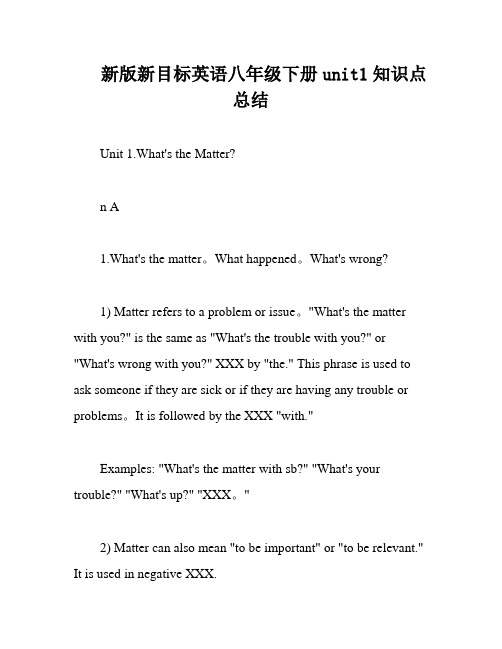
新版新目标英语八年级下册unit1知识点总结Unit 1.What's the Matter?n A1.What's the matter。
What happened。
What's wrong?1) Matter refers to a problem or issue。
"What's the matter with you?" is the same as "What's the trouble with you?" or "What's wrong with you?" XXX by "the." This phrase is used to ask someone if they are sick or if they are having any trouble or problems。
It is followed by the XXX "with."Examples: "What's the matter with sb?" "What's your trouble?" "What's up?" "XXX。
"2) Matter can also mean "to be important" or "to be relevant." It is used in negative XXX.Examples: "It XXX" (This phrase is XXX) "Does it matter if I'm a little late?"3) "XXX "actually."2.Foot (plural: XXX) refers to the part of the body that is used for XXX (plural: teeth) refers to the hard。
新目标英语八年级下册Unit1Willpeoplehaverobots知识点
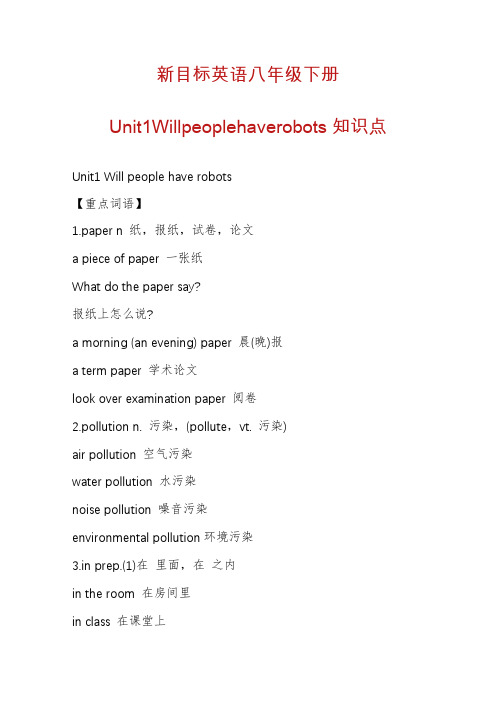
新目标英语八年级下册Unit1Willpeoplehaverobots知识点Unit1 Will people have robots【重点词语】1.paper n 纸,报纸,试卷,论文a piece of paper 一张纸What do the paper say?报纸上怎么说?a morning (an evening) paper 晨(晚)报a term paper 学术论文look over examination paper 阅卷2.pollution n. 污染,(pollute,vt. 污染)air pollution 空气污染water pollution 水污染noise pollution 噪音污染environmental pollution环境污染3.in prep.(1)在里面,在之内in the room 在房间里in class 在课堂上(2)在(某段时间)之间in the morning 在早上in the past 在过去I′ll come back in a day or two我过一两天就会回来in,after,later 接时间段,都可表示“(一段时间)之后”,它们有什么区别呢?①“in+一段时间”指“(将来的)一段时间之后”。
What will you be in five years?五年之后你干什么?We’ll start off in ten minutes.我们十分钟后出发。
②“after+一段时间”或“一段时间+later”表示“(在过去某个时间看来)一段时间之后”。
He went home after two days.他两天后回家了。
Three years later,she had a baby.三年后,她生了一个婴儿。
4.less adj. 较少的;少量的(little的比较级)They buy less beer and fewer cigarettes now现在他们买的啤酒和香烟比以前少了。
人教版新目标八年级下第一单元知识点汇总

1.what’s the matter with...?....怎么了2.have a sore back 后背疼3.talk too much 说太多话4.drink enough water 喝足够的水5.lie down and rest 躺下休息6.hot tea with honey 加蜂蜜的热茶7.see a dentist 看牙医8.get an X-ray 拍X光片9.put some medicine on 上药,敷药10.sound like 听起来像11.move my neck 移动我的脖子12.on the weekend 在周末13.all weekend 整个周末14.play computer games 玩电脑游戏15.That’s probably why. 那可能就是原因16.need to do 需要做某事17.take breaks 休息18.away from 远离19.sit in the same way 以相同的方式坐20.for too long 持续太久21.without doing sth. 没有做某事22.go to a doctor 去看医生23.feel hot 感觉热24.go along the road沿着公路行驶25.see sb doing sth看见某人正在做某事26.lie on the side of the road躺在马路边上27.next to在…旁边28.shout for help大喊求救29.24-year-old 24岁的30.without thinking twice没多想31.get off/on下车/上车32.what happened发生了什么33.have a heart problem有心脏病34.go to the hospital去医院35.have to do不得不做36.act quickly快点行动37.take sb. to sp.带某人去某地38.expect sb to do sth期待某人做某事39.most or all of the passengers大多数或所有乘客40.wait for the next bus等待下班车41.to one's surprise令某人吃惊的是42.agree to do同意做某事43.go with和…一起去44.help sb to do sth帮助某人做某事45.move…onto抬到…上46.thanks to多亏47.be saved by被…救48.in time及时49.help others帮助别人50.get into trouble陷入麻烦51.think about doing 考虑做某事52.save a life救命53.right away=at once立刻54.have a cold感冒55.have a cough咳嗽56.have a fever发烧57.have a headache头疼58.have a stomachache胃疼59.have a sore throat喉咙疼60.have a nosebleed流鼻血61.take one's temperature测体温62.hurt oneself/one's.....伤到自己或部位63.cut oneself/one's....切到自己或部位64.get hit on the head/nose撞到头鼻子65.get hit in the face/eye打到脸或眼睛66.get hit by a ball被球打了67.put a bandage on...绑绷带68.run it under water冲水69.press the sides of your nose压鼻子两侧70.put your head down把你的头低下71.clean your face洗脸72.rest for a few days休息几天73.feel sick感觉生病难受74.fall down摔倒75.get sunburned晒伤76.have problems breathing呼吸困难77.tell sb to do sth告诉某人做某事78.in PE class在体育课上79.be interested in=take an interestin对……感兴趣80. a mountain climber攀登者81.be used to doing习惯于做某事82.be used to do sth.=be used fordoing sth.被用于做某事ed to do sth.过去常常做某事e sth. to do sth.用某物做某事85.take risks=take a risk 冒险86.lose one’s life 丧命87.because of因为88.find sb. in a very dangeroussituation发现自己置于危险境地89.fall on sb. 掉在某人身上90.by oneself 独自91.free his arm 挣脱手臂92.run out (of) 用光,耗尽93.have to do sth. 不得不做某事94.save one’s own life 拯救自己的生命95.be ready to do 准备好做某事96.cut off 切除97.bandage oneself给自己包扎98.so that 为了99.so...that如此……以至于100.lose too much blood失血太多101.climb down the mountain 爬下山102.Between a rock and a Hard Place生死抉择103.mean doing sth.意味着做某事104.be in a difficult situation 在困境中105.seem to do 似乎做某事106.get out of 从……出来107.the importance of ……的重要性108.make good decisions 做好的决定109.be in control of 控制……110.in the control of在……控制下111.love for 对……的热爱112.keep on doing 坚持做某事113.the same as 和……一样114.think about 考虑115.make a decision=decide 做决定116.have a serious accident 有严重事故117.go mountain climbing 去爬山118.free oneself 挣脱自己119.give up doing sth. 放弃做某事120.mind doing sth. 介意做某事1)怎么了2)后背疼3)说太多话4)喝足够的水5)躺下休息6)加蜂蜜的热茶7)看牙医8)拍X光片9)上药,敷药10)听起来像11)移动我的脖子12)在周末13)整个周末14)玩电脑游戏15)那可能就是原因16)需要做某事17)休息18)远离19)以相同的方式坐20)持续太久21)没有做某事22)去看医生23)感觉热24)沿着公路行驶25)看见某人正在做某事26)躺在马路边上27)在…旁边28)大喊求救29)24岁的30)没多想31)下车/上车32)发生了什么33)有心脏病34)去医院35)不得不做36)快点行动37)带某人去某地38)期待某人做某事39)大多数或所有乘客40)等待下班车41)令某人吃惊的是42)同意做某事43)和…一起去44)帮助某人做某事45)抬到…上46)多亏47)被…救48)及时49)帮助别人50)陷入麻烦51)考虑做某事52)救命53)立刻54)感冒55)咳嗽56)发烧57)头疼58)胃疼59)喉咙疼60)流鼻血61)测体温62)伤到自己或部位63).切到自己或部位64)撞到头鼻子65)打到脸或眼睛66)被球打了67)绑绷带68)冲水69)压鼻子两侧70)把你的头低下71)洗脸72)休息几天73)感觉生病难受74)摔倒75)晒伤76)呼吸困难77)告诉某人做某事78)在体育课上79)对……感兴趣80)攀登者81)习惯于做某事82)被用于做某事83).过去常常做某事84)用某物做某事85)冒险86)丧命87)因为88)发现自己置于危险境地89)掉在某人身上90)独自91)挣脱手臂92)用光,耗尽93)不得不做某事94)拯救自己的生命95)准备好做某事96)切除97)给自己包扎98)为了99)如此……以至于100)失血太多101)爬下山102)生死抉择103)意味着做某事104)在困境中105)似乎做某事106)从……出来107)…的重要性108)做好的决定109)控制……110)在……控制下111)对……的热爱112)坚持做某事113)和……一样114)考虑115)做决定116)有严重事故117)去爬山118)挣脱自己119).放弃做某事120)介意做某事。
最新人教版八年级英语下册第一单元知识点汇总

最新人教版八年级英语下册第一单元知识点汇总Unit 1 What’s the matter?一、基础知识1.我感冒了。
可以表达为I had a cold、catch a cold或have the flu。
have a fever表示发烧,have a cough表示咳嗽,have a stomachache或肚子疼表示胃疼,have a toothache表示牙疼,have a headache表示头疼。
2.将身体部位和ache(疼痛)结合起来构成新的复合词,如stomach+ache=stomachache,head+ache=headache,tooth+ache=toothache,back+ache=backache,表示相应的疼痛。
3.“怎么啦?出什么事情了?”可以表达为What’ s the matter。
也可以用What’ s the trouble with you?或What’ s wrong with you。
matter和trouble为名词,其前可加the或形容词性物主代词,而wrong是形容词不能加the。
用于询问某人有什么病或遇到什么麻烦、问题,其后跟询问对象时,与介词with连用,如What’s the matter with sb。
= What’s your trouble?= What’s up?= What happens to sb。
举例来说,当问到“What’s the matter with you?”时,回答可以是“I have a bad cold.”4.maybe表示“或许”,常用于句首,表示可能性,后加句子。
例如Maybe you are right。
may be是情态动词+be的结构,意为“可能,也许”,后加名词、代词或形容词。
例如He maybe angry。
sound like可以和名词、代词以及从句结合使用,如It sounds like you don’t know the truth.It sounds like a good idea。
新人教版八年级英语下册第一单元知识点
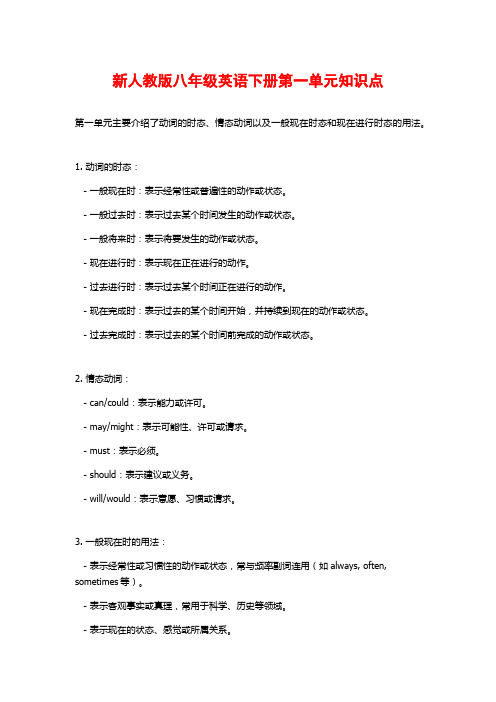
新人教版八年级英语下册第一单元知识点
第一单元主要介绍了动词的时态、情态动词以及一般现在时态和现在进行时态的用法。
1. 动词的时态:
- 一般现在时:表示经常性或普遍性的动作或状态。
- 一般过去时:表示过去某个时间发生的动作或状态。
- 一般将来时:表示将要发生的动作或状态。
- 现在进行时:表示现在正在进行的动作。
- 过去进行时:表示过去某个时间正在进行的动作。
- 现在完成时:表示过去的某个时间开始,并持续到现在的动作或状态。
- 过去完成时:表示过去的某个时间前完成的动作或状态。
2. 情态动词:
- can/could:表示能力或许可。
- may/might:表示可能性、许可或请求。
- must:表示必须。
- should:表示建议或义务。
- will/would:表示意愿、习惯或请求。
3. 一般现在时的用法:
- 表示经常性或习惯性的动作或状态,常与频率副词连用(如always, often, sometimes等)。
- 表示客观事实或真理,常用于科学、历史等领域。
- 表示现在的状态、感觉或所属关系。
4. 现在进行时的用法:
- 表示现阶段正在进行的动作或临时状态。
- 表示计划或安排的未来动作。
- 与always或often连用,表示经常性的不满或抱怨。
以上是第一单元的知识点,希望对你有帮助。
(完整版)新版人教版八年级英语下册第一单元重点知识点汇总
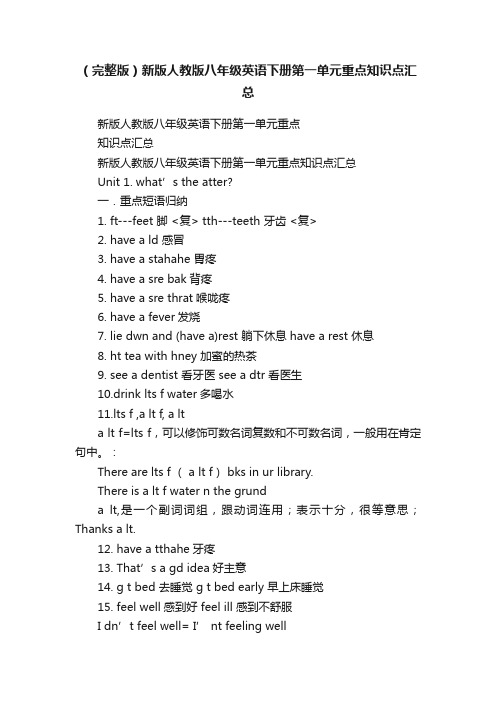
(完整版)新版人教版八年级英语下册第一单元重点知识点汇总新版人教版八年级英语下册第一单元重点知识点汇总新版人教版八年级英语下册第一单元重点知识点汇总Unit 1. what’s the atter?一.重点短语归纳1. ft---feet 脚 <复> tth---teeth 牙齿 <复>2. have a ld 感冒3. have a stahahe 胃疼4. have a sre bak背疼5. have a sre thrat喉咙疼6. have a fever发烧7. lie dwn and (have a)rest 躺下休息 have a rest 休息8. ht tea with hney 加蜜的热茶9. see a dentist 看牙医 see a dtr 看医生10.drink lts f water多喝水11.lts f ,a lt f, a lta lt f=lts f,可以修饰可数名词复数和不可数名词,一般用在肯定句中。
:There are lts f ( a lt f) bks in ur library.There is a lt f water n the grunda lt,是一个副词词组,跟动词连用;表示十分,很等意思;Thanks a lt.12. have a tthahe牙疼13. That’s a gd idea好主意14. g t bed 去睡觉 g t bed early 早上床睡觉15. feel well感到好 feel ill 感到不舒服I dn’t feel well=I’ nt feeling well我感觉不舒服.16. start ding/ t d sth开始做某事T D 是一件事情完成了,开始做另外一件事情DING是原的那件事情做到一半,现在又开始做了,是同一件事情。
17. tw days ag两天前18. get se rest 多休息, 休息一会儿19. I think s我认为是这样20. be thirsty口渴21. be hungry 饥饿22. be stressed ut紧张23. listen t usi听音乐24. healthy lifestyle健康的生活方式25. traditinal hinese dtrs传统中医26. need t d sth 需要做某事I have a tthahe. I need t see a dentist. 我牙痛, 我需要去看牙医.e need t keep ur lassr lean. 我们需要保持教室的干净.27. a balane f yin and yang阴阳平衡28. fr exaple例如29. t uh yin太多的阴, 阴气太盛t uh + 不可数名词太多的…uh t +形/副实在太…极其,非常t any + 可数名词复数太多的…30.be gd fr sth./ ding sth. 对什么有益,对什么有好处be bad fr sth./ ding sth. 对什么有害be gd t 对…好be gd at =d well in 在……方面好,擅长be gd(bad) fr、be gd at的相关用法1.be gd fr 对......有益Ding rning exerises is gd fr yur health.做早操对你们的建康有益。
最新人教版八年级下册英语第一单元知识点
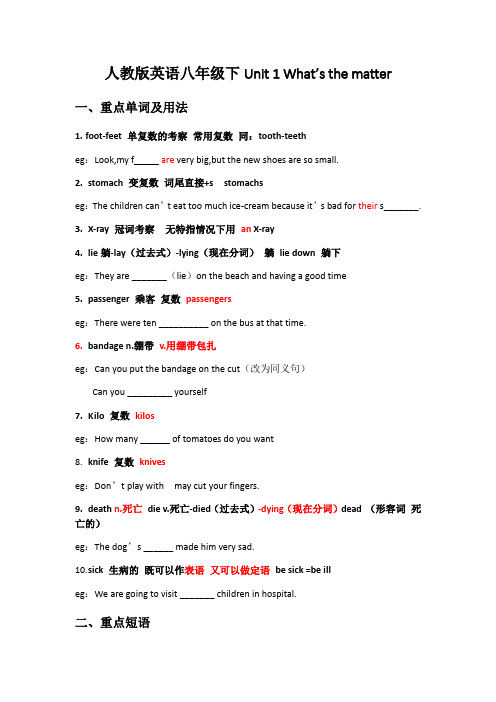
人教版英语八年级下Unit 1 What’s the matter一、重点单词及用法1.foot-feet 单复数的考察常用复数同:tooth-teetheg:Look,my f_____ are very big,but the new shoes are so small.2.stomach 变复数词尾直接+s stomachseg:The children can’t eat too much ice-cream because it’s bad for their s_______.3.X-ray 冠词考察无特指情况下用an X-ray4.lie躺-lay(过去式)-lying(现在分词)躺lie down 躺下eg:They are _______(lie)on the beach and having a good time5.passenger 乘客复数passengerseg:There were ten __________ on the bus at that time.6.bandage n.绷带v.用绷带包扎eg:Can you put the bandage on the cut(改为同义句)Can you _________ yourself7.Kilo 复数kiloseg:How many ______ of tomatoes do you want8.knife 复数kniveseg:Don’t play with may cut your fingers.9.death n.死亡die v.死亡-died(过去式)-dying(现在分词)dead (形容词死亡的)eg:The dog’s ______ made him very sad.10.s ick 生病的既可以作表语又可以做定语be sick =be illeg:We are going to visit _______ children in hospital.二、重点短语have a cold =catch a cold =have the flu 感冒cough 咳嗽lie down 躺下take one’s temperature 量体温have a fever 发烧take/have breaks/a break 休息=take/have a rest get off 下车-get on上车to one’s surprise 令某人惊讶的是right away 立刻马上=right now get into (trouble)陷入(麻烦)get sunburned 被晒伤be used to (doing)习惯于适应于...... take risks/a risk 去冒险run out (of)用完用尽cut off 切除get out of 离开从......出来be in control of 掌管管理give up (doing)放弃(做)某事have a stomachache 胃痛get an X-ray 做一个X射线检查thanks to......由于多亏in time 及时on time 准时think about 考虑think of认为fall down 摔倒make a decision 作决定put......on......把....放在...上be interested in 对...感兴趣三、用法总结1.need to do sth需要做某事eg: The teacher needs_____(rest) for a few minutes.like 意为“听起来像”后接n./adj./句子eg: It sounds like a good idea.类似的感官动词+like:feel like/smell like/ look like/taste like/seem likesound+adj. 结构中,sound 是系动词意为“听起来是”后接形容词eg:That sounds great.+n./doing(v.现在分词)He went to school without having breakfast. eg:He left the classroom without ________ anythingv.同意,赞成agree with sb/某人的意见看法Does she agree with usagree to do sth 同意做某事They agreed to solve the problem. problems (in) doing sth做某事有困难=have trouble/difficulty (in) doinghave problems with sth =have trouble/difficulty with sth 在某方面有困难eg:One of my good friends said he had problems__________(learn) English.get used to doing sth 习惯于做某事eg:He used to get up late,but now he is used to getting up early.used to do sth 过去常常做某事(现在不做了)eg:He used to read English in the evening.use sth to do sth 使用用某物做某事eg:So he used knife to cut off his arm.be used to do sth 被动被用于做某事eg:These new pens are used to paint the wall.one’s life 丧失生命save one’s life 挽救某人的生命eg:He lost his life in the car accident.adj.足够的充足的后接名词n. enough moneyadv.足够地修饰形容词/副词enough要后置eg:The book is_______,but I don’t have enough money ______it.interesting; to buy enough; to buyenough; buying interesting; buying9. the importance of (doing)sth (做)某事的重要性important adj.重要的unimportant adj.不重要的importance n.重要性eg:We students should know the importance of (learning)English.n.决定make a decision (to do sth)decide to do sth 决定做某事decide not to do sth 决定不做某事eg:Tom made a decision to study English well.up 放弃give up 是动词+副词结构接代词作宾语时代词放中间eg:The problem is so difficult for you,but don’t _______A.give it up it out up it out itgive up doing sth 放弃做某事eg:You will be very sad if you give up______(sing).用法keep on doing sth 继续做某事(中间有间隔强调重复性)eg:He kept on studying though he was very tired.keep doing sth 继续不停地做某事(不间断连续性)eg:Keep walking until you reach the end of the road.keep sb doing 让某人一直做某事eg:Don’t keep the other students waiting.keep sb from doing sth 阻止某人做某事eg:We should keep the little boy from stepping on the grass.用法find找到,强调寻找的结果look for强调寻找过程find out找出查明eg:I was looking for my watch,but I didn’t find it.find sb doing sth 发现某人正在做某事eg:When I walked along the road,I found an old man shouting for help.find it +adj形容词+to do sth 发现做某事是...的eg:She found it hard to finish the work by herself.risks=take a risk 冒险He likes taking risks.risk one’s life to do 冒着生命危险去做某事eg:He risked his life to save the child.risk doing stheg: The man called Tom often risks flying over the sea.四、短语辨析1.see sb doing sth 看见某人正在做某事(动作正在发生)see sb do sth 看见某人做某事(看到动作全过程或者经常看到动作发生)eg:I saw the boy crying when I passed by(路过).类似的hear/watch/notice/find+sb do/doing sththanks to 多亏... 由于....=with the help of/with one’s help=because ofthanks for 因.......而感谢强调感谢的原因eg:Thanks to my teacher ,I passed the exam.Thanks for your help .Thanks for inviting me.2.in time 及时表示动作在规定时间内或比规定时间提前发生on time 准时按时指正好在规定时间内eg:Thanks for coming here to help me in time.The train arrived into the station on time.火车准时进站了。
新版新目标英语八年级下册Unit 1知识点总结

新版新目标英语八年级下册Unit 1知识点总结新版新目标英语八年级下册 Unit 1 知识点总结一、词汇1. 与学校有关的词汇- classroom:教室- library:图书馆- playground:操场- canteen:食堂- laboratory:实验室- office:办公室- gymnasium:体育馆- bathroom:洗手间2. 与科目有关的词汇- math:数学- English:英语- science:科学- history:历史- geography:地理- art:美术- music:音乐- PE (Physical Education):体育3. 与研究活动有关的词汇- study:研究- homework:家庭作业- test:考试- exam:考试- project:课题- report:报告- presentation:演讲二、句型1. 询问状况的句型- How are you doing?:最近怎么样?- How's everything going?:一切都好吗?- How's it going?:怎么样?- What's up?:有什么新鲜事吗?2. 表达喜欢的句型- I like...:我喜欢...- I love...:我喜爱...- I enjoy...:我喜欢...- My favorite subject is...:我最喜欢的科目是...3. 描述课程安排的句型- We have... on (day):我们在(星期几)有... - I have... at (time):我在(时间)有...- Our class starts at...:我们的课程从...开始- Our class ends at...:我们的课程到...结束三、语法1. 现在进行时现在进行时表示现在(说话时)正在进行的动作。
用法:主语 + am/is/are + 动词-ing- I am studying English now.:我现在正在研究英语。
人教版(新目标)初中英语八年级下册Unit 1
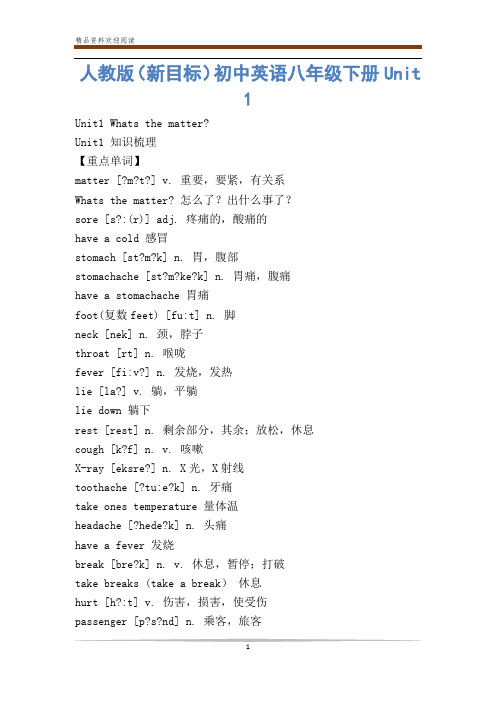
人教版(新目标)初中英语八年级下册Unit1Unit1 Whats the matter?Unit1 知识梳理【重点单词】matter [?m?t?] v. 重要,要紧,有关系Whats the matter? 怎么了?出什么事了?sore [s?:(r)] adj. 疼痛的,酸痛的have a cold 感冒stomach [st?m?k] n. 胃,腹部stomachache [st?m?ke?k] n. 胃痛,腹痛have a stomachache 胃痛foot(复数feet) [fu:t] n. 脚neck [nek] n. 颈,脖子throat [rt] n. 喉咙fever [fi:v?] n. 发烧,发热lie [la?] v. 躺,平躺lie down 躺下rest [rest] n. 剩余部分,其余;放松,休息cough [k?f] n. v. 咳嗽X-ray [eksre?] n. X光,X射线toothache [?tu:e?k] n. 牙痛take ones temperature 量体温headache [?hede?k] n. 头痛have a fever 发烧break [bre?k] n. v. 休息,暂停;打破take breaks (take a break)休息hurt [h?:t] v. 伤害,损害,使受伤passenger [p?s?nd] n. 乘客,旅客off [?f] adv. prep. 离开(某处);从去掉get off 下车to ones surprise 使惊讶,出乎意料onto [nt?] prep. 向,朝trouble [?tr?bl] n. 麻烦,烦扰,问题hit [hit] n. v. 碰撞,打,打击right away 立即,马上get into 陷入,参与herself [h?:?self] pron. 她自己,她本身(she的反身代词)bandage [b?nd?d?] n. v. 绷带;用绷带包扎sick [s?k] adj. 患病的,不适的knee [ni:] n. 膝盖nosebleed [?nzbli:d] n. 鼻出血breathe [bri:e] v. 呼吸sunburned [?s?nb?:nd] adj. 晒伤的ourselves [ɑ:?selvz] pron. 我们自己(we的反身代词)climber [?kla?m?(r)] n. 登山者be used to 习惯于适应于risk [r?sk] n. v. 风险,危险;冒险take risks (take a risk) 冒险accident [ksid?nt] n. 意外事件;事故situation [?sitju?ein] n. 状况,形式,情况kg=kilogram [?k?l?gr?m] n. 公斤,千克rock [r?k] n. 岩石run out (of) 用尽,耗尽knife [naif] n. 刀,餐刀cut off 切除blood [bl?d] n. 血mean [mi:n] v. 意味着,意思是,意欲get out of 离开,从出来importance [?m?p?:tns] n. 重要性decision [d?sn] n. 决心,决定,抉择control [k?ntrl] v. 控制,支配,操纵be in control of 掌管,管理spirit [sp?r?t] n. 勇气,意志death [de] n. 死亡give up 放弃nurse [n?:s] n. 护士【重点短语】1.have a fever 发烧2.have a cough 咳嗽3.have a toothache 牙疼4.talk too much 说得太多5.drink enough water 喝足够的水6.have a cold 受凉;感冒7.have a stomachache 胃疼8.have a sore back 背疼9.have a sore throat 喉咙痛10. take risks 冒险11.hot tea with honey 加蜂蜜的热茶12.see a dentist 看牙医13.get an X-ray 拍X 光片14.take one s temperature 量体温15.put some medicine on sth. 在上面敷药16. give up 放弃17. sound like 听起来像18. all weekend 整个周末19. in the same way 以同样的方式20. go to a doctor 看医生21. go along 沿着走22. on the side of the road 在马路边23. shout for help 大声呼救24. without thinking twice 没有多想25. get off 下车26. have a heart problem 有心脏病27. to one s surprise 另某人惊讶的是28. thanks to 多亏了;由于29. in time 及时30. make a decision 做出决定31. get into trouble 造成麻烦32. right away 立刻;马上33. because of 由于34. get out of 离开;从出来35. keep on doing sth. 继续或坚持做某事36. put a bandage on sth. 用绷带包扎37. fall down 摔倒38. feel sick 感到恶心39. have a nosebleed 流鼻血40. cut his knee 割伤他的膝盖41. put her head back 把她的头向后仰42. have problems breathing 呼吸困难43. mountain climbing 登山运动44. be used to doing sth. 习惯做某事45. run out (of) 用完;用尽46. so that 以便47. so...that... 如此以至于...48. be in control of 掌管;管理49. in a difficult situation 在闲境中【重点句型】1. Whats the matter with you?= Whatthe trouble with you?= Whats wrong with you? 你怎么了?2. What should she do? 她该怎么办呢?3.Should I take my temperature? 我应该量一下体温吗?4.You should lie down and rest. 你应该躺下休息一会儿。
八年级英语下册 Unit 1 What’s the matter知识点总结、作文 (新版)人教新目标
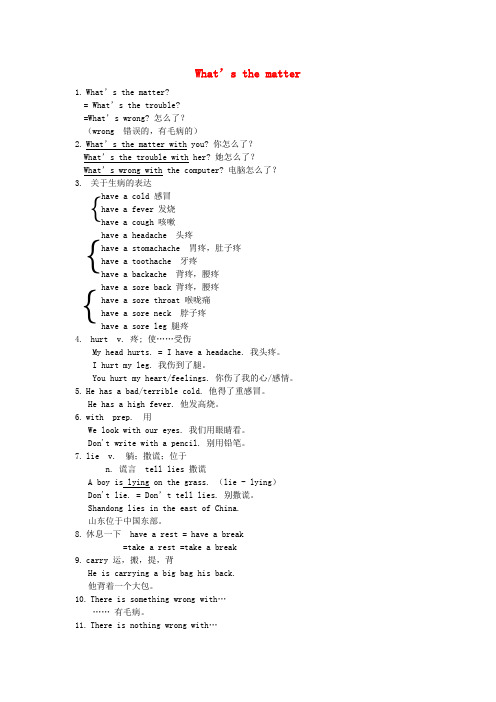
What’s the matter1.What’s the matter?= What’s the trouble?=What’s wrong? 怎么了?(wrong 错误的,有毛病的)2.What’s the matter with you? 你怎么了?What’s the trouble with her? 她怎么了?What’s wrong with the computer? 电脑怎么了?感冒发烧咳嗽头疼胃疼,肚子疼牙疼背疼,腰疼背疼,腰疼喉咙痛脖子疼腿疼疼; 使……受伤My head hurts. = I have a headache. 我头疼。
I hurt my leg. 我伤到了腿。
You hurt my heart/feelings. 你伤了我的心/感情。
5.He has a bad/terrible cold. 他得了重感冒。
He has a high fever. 他发高烧。
6.with prep. 用We look with our eyes. 我们用眼睛看。
Don't write with a pencil. 别用铅笔。
7.lie v. 躺;撒谎;位于n. 谎言 tell lies 撒谎A boy is lying on the grass. (lie - lying)Don't lie. = Don’t tell lies. 别撒谎。
Shandong lies in the east of China.山东位于中国东部。
8.休息一下 have a rest = have a break=take a rest =take a break9.carry 运,搬,提,背He is carrying a big bag his back.他背着一个大包。
10.There is something wrong with………有毛病。
11.There is nothing wrong with………没毛病。
人教新目标八年级英语下册第一单元知识点(K12教育文档)

人教新目标八年级英语下册第一单元知识点(word版可编辑修改)编辑整理:尊敬的读者朋友们:这里是精品文档编辑中心,本文档内容是由我和我的同事精心编辑整理后发布的,发布之前我们对文中内容进行仔细校对,但是难免会有疏漏的地方,但是任然希望(人教新目标八年级英语下册第一单元知识点(word版可编辑修改))的内容能够给您的工作和学习带来便利。
同时也真诚的希望收到您的建议和反馈,这将是我们进步的源泉,前进的动力。
本文可编辑可修改,如果觉得对您有帮助请收藏以便随时查阅,最后祝您生活愉快业绩进步,以下为人教新目标八年级英语下册第一单元知识点(word版可编辑修改)的全部内容。
Unit 1 What's the matter?一.询问某人患了何种疾病或遇到什么麻烦时,常用以下句型:1。
What’s the matter (with sb)? 2。
What’s the trouble / problem(with sb)?3.What’s wrong (with sb)? 你怎么了?4. What's one's trouble / problem ?5.What’s up ? 6。
What happened to sb ?7.Are you OK ? 8。
Is there anything wrong with sb ?二.表达身体不适或疼痛时,常用以下结构:1。
Sb + have /has + a / an + 疾病名称: have a cold / fever / cough / temperature2.Sb + have/ has a sore +身体部位: have a sore throat / back3。
Sb + have / has+ a+ 身体部位-ache have a toothache /headache / stomachache / earache /backache4.Sb + hurt(s) +身体部位/ oneself ; He hurt his leg .或身体部位+ hurts ; My head hurts badly .5。
八年级英语下册Unit1单元系统复习知识点归纳人教新目标版
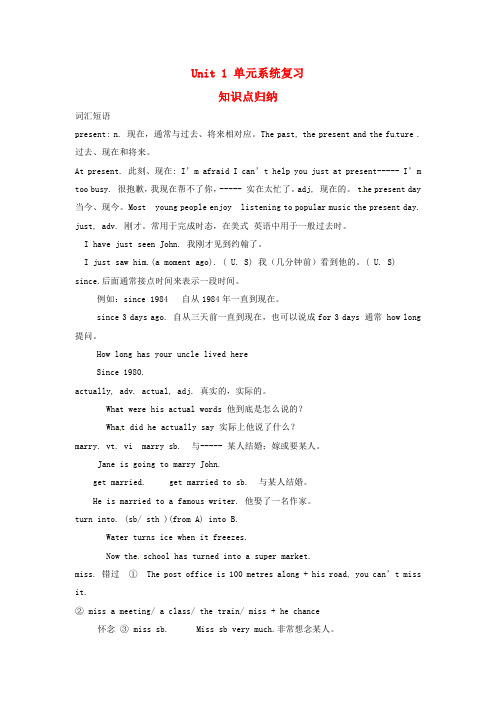
Unit 1 单元系统复习知识点归纳词汇短语present: n. 现在,通常与过去、将来相对应。
The past, the present and the fu ture . 过去、现在和将来。
At present. 此刻、现在: I’m afraid I can’t help you just at present----- I’m too busy. 很抱歉,我现在帮不了你,----- 实在太忙了。
adj, 现在的。
t he present day 当今、现今。
Most young people enjoy listening to popular music the present day. just, adv. 刚才。
常用于完成时态,在美式英语中用于一般过去时。
I have just seen John. 我刚才见到约翰了。
I just saw him.(a moment ago). ( U. S) 我(几分钟前)看到他的。
( U. S) since.后面通常接点时间来表示一段时间。
例如:since 1984 自从1984年一直到现在。
since 3 days ago. 自从三天前一直到现在,也可以说成for 3 days 通常 how long 提问。
How long has your uncle lived hereSince 1980.actually, adv. actual, adj. 真实的,实际的。
What were his actual words 他到底是怎么说的?Wha t did he actually say 实际上他说了什么?marry. vt. vi marry sb. 与----- 某人结婚;嫁或要某人。
Jane is going to marry John.get married. get married to sb. 与某人结婚。
He is married to a famous writer. 他娶了一名作家。
人教新目标八年级英语下册Unit 1 知识点总结
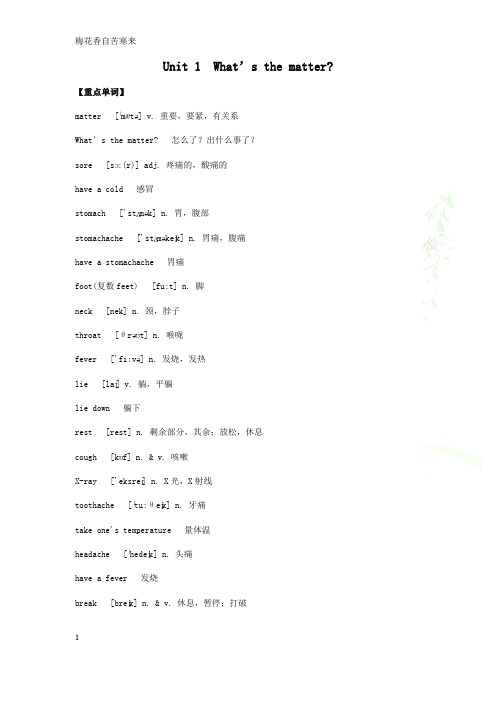
Unit 1 What’s the matter?【重点单词】matter [ˈmætə] v. 重要,要紧,有关系What’s the matter? 怎么了?出什么事了?sore [sɔ:(r)] adj. 疼痛的,酸痛的have a cold 感冒stomach ['stʌmək] n. 胃,腹部stomachache ['stʌməkeɪk] n. 胃痛,腹痛have a stomachache 胃痛foot(复数feet) [fu:t] n. 脚neck [nek] n. 颈,脖子throat [θrəʊt] n. 喉咙fever ['fi:və] n. 发烧,发热lie [laɪ] v. 躺,平躺lie down 躺下rest [rest] n. 剩余部分,其余;放松,休息cough [kɒf] n. & v. 咳嗽X-ray ['eksreɪ] n. X光,X射线toothache [ˈtu:θeɪk] n. 牙痛take one's temperature 量体温headache [ˈhedeɪk] n. 头痛have a fever 发烧break [breɪk] n. & v. 休息,暂停;打破take breaks (take a break)休息hurt [hə:t] v. 伤害,损害,使受伤passenger ['pæsɪndʒə] n. 乘客,旅客off [ɒf] adv. prep. 离开(某处);从…去掉get off 下车to one's surprise 使…惊讶,出乎…意料onto [ˈɒntə] prep. 向,朝trouble [ˈtrʌbl] n. 麻烦,烦扰,问题hit [hit] n. & v. 碰撞,打,打击right away 立即,马上get into 陷入,参与herself [hə:ˈself] pron. 她自己,她本身(she的反身代词)bandage ['bændɪdʒ] n. & v. 绷带;用绷带包扎sick [sɪk] adj. 患病的,不适的knee [ni:] n. 膝盖nosebleed [ˈnəʊzbli:d] n. 鼻出血breathe [bri:ð] v. 呼吸sunburned [ˈsʌnbɜ:nd] adj. 晒伤的ourselves [ɑ:ˈselvz] pron. 我们自己(we的反身代词)climber [ˈklaɪmə(r)] n. 登山者be used to 习惯于… 适应于…risk [rɪsk] n. & v. 风险,危险;冒险take risks (take a risk) 冒险accident [ˈæksidənt] n. 意外事件;事故situation [ˌsitjuˈeiʃən] n. 状况,形式,情况kg=kilogram [ˈkɪləgræm] n. 公斤,千克rock [rɔk] n. 岩石run out (of) 用尽,耗尽knife [naif] n. 刀,餐刀cut off 切除blood [blʌd] n. 血mean [mi:n] v. 意味着,意思是,意欲get out of 离开,从… 出来importance [ɪmˈpɔ:tns] n. 重要性decision [dɪ'sɪʒn] n. 决心,决定,抉择control [kən'trəʊl] v. 控制,支配,操纵be in control of 掌管,管理spirit ['spɪrɪt] n. 勇气,意志death [deθ] n. 死亡give up 放弃nurse [nə:s] n. 护士【重点短语】1.have a fever 发烧2.have a cough 咳嗽3.have a toothache 牙疼4.talk too much 说得太多5.drink enough water 喝足够的水6.have a cold 受凉;感冒7.have a stomachache 胃疼8.have a sore back 背疼9.have a sore throat 喉咙痛10. take risks 冒险11.hot tea with honey 加蜂蜜的热茶12.see a dentist 看牙医13.get an X-ray 拍X 光片14.take one’ s temperature 量体温15.put some medicine on sth. 在……上面敷药16. give up 放弃17. sound like 听起来像18. all weekend 整个周末19. in the same way 以同样的方式20. go to a doctor 看医生21. go along 沿着……走22. on the side of the road 在马路边23. shout for help 大声呼救24. without thinking twice 没有多想25. get off 下车26. have a heart problem 有心脏病27. to one’ s surprise 另某人惊讶的是28. thanks to 多亏了;由于29. in time 及时30. make a decision 做出决定31. get into trouble 造成麻烦32. right away 立刻;马上33. because of 由于34. get out of 离开;从……出来35. keep on doing sth. 继续或坚持做某事36. put a bandage on sth. 用绷带包扎37. fall down 摔倒38. feel sick 感到恶心39. have a nosebleed 流鼻血40. cut his knee 割伤他的膝盖41. put her head back 把她的头向后仰42. have problems breathing 呼吸困难43. mountain climbing 登山运动44. be used to doing sth. 习惯做某事45. run out (of) 用完;用尽46. so that 以便47. so...that... 如此……以至于...…48. be in control of 掌管;管理49. in a difficult situation 在闲境中【重点句型】1. What's the matter with you?= What'the trouble with you?= What's wrong with you? 你怎么了?2. What should she do? 她该怎么办呢?3.Should I take my temperature? 我应该量一下体温吗?4.You should lie down and rest. 你应该躺下休息一会儿。
新目标英语 八年级下册 Unit1-10单元 重点短语+句型
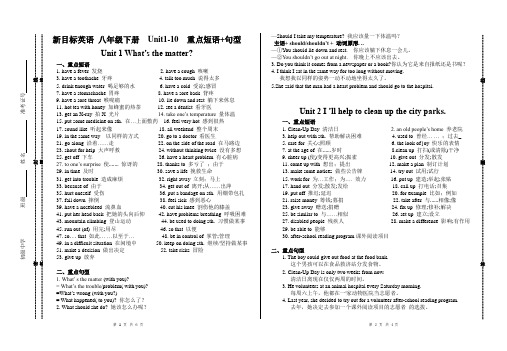
初级中学 班级 姓名 准考证号……………………………密……………………………………………………封…………………………………………线……………………… ……………………………答……………………………………………………题…………………………………………线……………………………………………………答……………………………………………………题…………………………………………线………………………新目标英语 八年级下册 Unit1-10 重点短语+句型Unit 1 What’s the matter?一、重点短语1. have a fever 发烧2. have a cough 咳嗽3. have a toothache 牙疼4. talk too much 说得太多5. drink enough water 喝足够的水6. have a cold 受凉;感冒7. have a stomachache 胃疼8. have a sore back 背疼9. have a sore throat 喉咙痛 10. lie down and rest 躺下来休息 11. hot tea with honey 加蜂蜜的热茶 12. see a dentist 看牙医13. get an X-ray 拍X 光片 14. take one’s temperature 量体温 15. put some medicine on sth. 在…上面敷药 16. feel very hot 感到很热 17. sound like 听起来像 18. all weekend 整个周末 19. in the same way 以同样的方式 20. go to a doctor 看医生21. go along 沿着……走 22. on the side of the road 在马路边 23. shout for help 大声呼救 24. without thinking twice 没有多想 25. get off 下车 26. have a heart problem 有心脏病 27. to one’s surprise 使....... 惊讶的 28. thanks to 多亏了 ;由于 29. in time 及时 30. save a life 挽救生命 31. get into trouble 造成麻烦 32. right away 立刻;马上 33. because of 由于 34. get out of 离开;从……出萍35. hurt oneself 受伤 36. put a bandage on sth. 用绷带包扎 37. fall down 摔倒 38. feel sick 感到恶心39. have a nosebleed 流鼻血 40. cut his knee 割伤他的膝盖41. put her head back 把她的头向后仰 42. have problems breathing 呼吸困难 43. mountain climbing 登山运动 44. be used to doing sth. 习惯做某事 45. run out (of) 用完;用尽 46. so that 以便47. so. . . that 如此… …以至于… 48. be in control of 掌管;管理49. in a difficult situation 在闲境中 50. keep on doing sth. 继续/坚持做某事 51. make a decision 做出决定 52. take risks 冒险 53. give up 放弃二、重点句型1. What’ s the matter (with you)?= What’s the trouble /problem( with you)? =What ’s wrong (with you?)= What happened( to you)? 你怎么了? 2. What should she do? 她该怎么办呢?—Should I take my temperature? 我应该量一下体温吗? 主语+ should/shouldn’t + 动词原形. ..—①You should lie down and rest. 你应该躺下休息一会儿。
人教版八年级英语下册unit1知识点归纳整理+新人教版,grammar-focusogkk精品

新人教版八年级英语下册unit1知识点归纳整理+新人教版,grammar-focusogkk精品新人教版八年级英语下册,unit1知识点一、基本知识点1. What’s the matter (with you)? 怎么了?出什么事了?What’s the trouble/ the problem / wrong with sb./ sth.?2. I had a cold.我感冒了。
have a cold=catch a cold=have the flu have a fever have a cough咳嗽have a stomachache胃疼,肚子疼have a toothache牙疼have a headache头疼3. 身体部位+ache(疼痛)构成新的复合词stomach+ache=stomachache head+ache=headache tooth+ache=toothache back+ache=backache后背痛4. much too+ 词,意为,too much+ 词,意为。
5. enough【形容、副词】足够的/地,enough放在名前后,形副后。
good enough足够好,enough money=money money6. lie down躺下,lie 躺,躺着,过去式lay;lie说谎,过去式lied7. maybe “或许”,常用于句首,表示可能性,后加句子。
Maybe you are right.may be,是情态动词+be的结构,意为“可能,也许”,后加名词、代词或形容词。
He may be angry.8. sound like+名词代词和从句:It sounds like you don’t know the truth. It sounds like a good idea.sound+形容词,“听起来,好像”,The music sounds nice.9. need 需要,实义动词need+名词,需要某物;need to do sth.需要做某事,主语通常是人,表示人主动的动作:You need to listen carefully during class.need doing sth.主语通常是物,表示被动的动作:Your dirty clothes need washing.10. get off (the bus) 下(公交车)get on 上车11. agree 同意,赞同;同意做某事,同意某人的看法、观点。
- 1、下载文档前请自行甄别文档内容的完整性,平台不提供额外的编辑、内容补充、找答案等附加服务。
- 2、"仅部分预览"的文档,不可在线预览部分如存在完整性等问题,可反馈申请退款(可完整预览的文档不适用该条件!)。
- 3、如文档侵犯您的权益,请联系客服反馈,我们会尽快为您处理(人工客服工作时间:9:00-18:30)。
八年级下册Unit1 What’s the matter?知识点Section A1. What’ s the matter?怎么啦?出什么事情了?用于询问某人有什么病或某人遇到什么麻烦、问题等,其后跟询问对象时与介词with连用。
What’s the matter (with sb.)?= What’s wrong (with sb.) ?It doesn’t matter 没关系(回答别人道歉时的用语)2. have a cold=catch a cold 患感冒have a/an + 疾病名词“患……病”have a sore throat 患喉咙痛have a sore back 患背痛have a fever 发烧have a stomachache 患胃痛have a toothache患牙痛have a headache 患头痛have a backache患背痛3.辨析too much/too many/much tootoo much,太多,(1) 修饰不可数名词too much money(2) 修饰动词,放在动词之后eat too muchtoo many, 太多, 修饰可数名词复数too many students much too, 太, 修饰形容词或副词much too cold4.enough 的用法(1) adj. 足够的,充分的,修饰名词,放在名词之前:enough time(2)adv. 足够地,十分,相当,修饰adj.或adv, 放在adj.或adv. 之后:expensive enough(3) be +adj. +enough to do sth. 足够…去做某事He is strong enough to carry the box.5.lie down 躺下来lie→过去式lay→现在分词lying。
6. drink some hot tea with honey. 喝一些加蜂蜜的热茶。
with prep (反)without “具有,带有” , 表示某物带有或具有某种特征。
7. see a dentist = go to a dentist看牙医see a doctor = go to a doctor 看医生8. take one’s temperature 量体温9. What should she do? 她该怎么办呢?should “应该” 情态动词,后跟动词原形,表示责任和义务, should not =shouldn’t 不应该10.sound like 听起来像,后接名词或名词性短语作表语。
It sounds like a good idea.11. need v. 需要◆做实义动词,用于肯定句: (1)当主语是人,用sb. need to do sth. 某人需要做某事You need to drink more water.(2)当主语是物,用sth. need doing某事需要被做My TV set needs repairing.◆做情态动词,常用于否定句或疑问句needn’t = don’t have to 没有必要◆must或need引导的一般疑问句, 肯定回答用must,否定回答用needn’t或don’t have to—Must I hand in my exercise book now, Mr. Zhao? —No, you needn’t/ don’t have to.12.take breaks=take a break休息13.away from…远离…14.in the same way 用同样的方式/方法15. without doing sth. 没有做某事16. see sb. do sth. 看见某人做了某事(看到动作发生的全过程或经常看到动作发生)see sb. doing sth 看见某人正在做某事(强调动作正在发生)17. 24-year-old adj. 24岁的“数词+名词(+形容词)”构成复合形容词,在句中作定语,用连字符连接,中间的名词必须用单数。
18. without think twice 没有考虑,没有思考think twice 再三考虑19. get off 下车(反)get on 上车20. expect to do sth. 期望做某事expect sb. to do sth. 期望某人做某事21. wait for 等待22. surprise ⑴v. 使吃惊→surprising adj. 令人吃惊的→surprised adj. 吃惊的(以-ed结尾的adj.修饰人, 以-ing结尾的adj.修饰物。
) be surprised at 对……感到吃惊be surprised to do sth 做某事感到惊讶⑵ n. 惊讶to one’s surprise 使某人吃惊的是;in surprise 吃惊地23. agree v. → (反) disagree v.agree with sb. 同意某人agree to do sth. 同意做某事24. help sb. (to) do sth. 帮助某人做某事help sb. with sth. 在某事上帮助某人25.thanks to (+感谢的对象) 幸亏;由于thanks /thank you for (+感谢的原因) 因……而感谢26. on time 准时in time 及时27.It’s said that + 句子据说…28. think about 考虑;思考think of 想起,认为精品文档think over 仔细考虑think up = come up with 想出29. right away 立刻,马上= at once30. get into trouble 陷入麻烦(或烦恼)get into 陷入be in trouble 处于困境中32. fall →fell →fallen v 落下;跌落fall down (from ) 摔倒,掉下,跌落Section B1. feel sick 生病;不舒服辨析:sick /ill adj. 生病的(1) sick adj. 生病的,既可放系动词后作表语,也可放名词前作定语。
be sick of …讨厌;厌恶……sick person = patient病人(2) ill adj.“生病的”,只能放在系动词后作表语,be ill in hospital 生病住院ill → illness n. 病;疾病2.tell sb. to do sth. 告诉某人做某事tell sb. not to do sth. 告诉某人不要做某事tell sb. sth. = tell sth. to sb. 告诉某人某事3. have trouble / problem / difficult (in) doing sth.做某事有困难4. be interested in对……感兴趣interest ⑴interest v. 引起…关注;使…感兴趣→interesting adj. 令人有兴趣的→interested adj.感兴趣的⑵n. 兴趣places of interest 名胜古迹5. be used to (doing) sth. 习惯于(做)某事use v. 使用→useful adj. 有用的use sth. to do sth 用某物做某事6.take risks = take a risk 冒险risk doing sth. 冒险做某事;风险做某事7. one of …......之一one of + the +最高级+名词复数最…的…之一当one of …做主语时,谓语动词用第三人称单数形式。
8.lose→ lost v. 失去lose one’s life 失去生命get /be lost 迷路9.because of 由于;因为,介词短语,后接名词或动词ing形式;because 因为,连词,后接句子;回答why引导的问句;because 和so 不能同时在一个句子中连用。
10. find →found v. 找到,发现find it + adj. + to do sth. 发现做某事很……find it difficult/ hard to do sth 发现做某事很困难11. by oneself= alone = on one’s own adj. 单独的,指无人陪伴的客观事实,不带感情色彩。
12.run →ran v. 跑run out用完,主语是物,sth. run outrun out of = use up 主语是人, sb. run out of sth.13.own ①adj. 自己的,常用在形容词性物主代词后面,强调某人自己的;②v. 拥有(= have) →owner n. 所有者,物主14.be ready to do sth. 准备做某事15.cut off 切除16.so that 以便,为了引导目的状语从句, 从句常出现情态动词may/ might .can/ could等。
17.mean →meant v. 意味着→meaning n. 意思mean doing sth. 意味着做某事mean to do sth. 打算做某事What is the meaning of...? ...的意思是什么?18.get out of 离开,从……出来与get 相关的短语:get up起床 get to到达 get back 返回get on 上车 get off 下车get on with 与……友好相处;19.important adj. 重要的(反)unimportant→importance n. 重要性the importance of ……..的重要性20. decide v 决定→decision n. 决定decide to do sth. 决定做某事make a decision = make decisions做决定21. be in control of 掌管;管理22. so …that 如此…..以致……,引导结果状语从句, so 后面接形容词或副词23. keep on (doing sth.) 继续或坚持做某事24. the same … as…和......一样反义:be different from 与......不同25. die v.→death n. 死,死亡→dead adj. 死的→dying adj. 将死的26. mind v. 介意n. 头脑,想法,记忆make up one’s mind 下定决心never mind 不要紧mind doing sth. 介意做某事Would you mind doing sth.?你介意做某事吗?27. give up 放弃give up doing sth. =stop doing sth. 放弃做某事单元语法:反身代词精品文档1.反身代词的意义:表示动作反射到本身或强调自己的代词。
